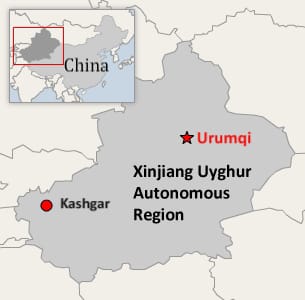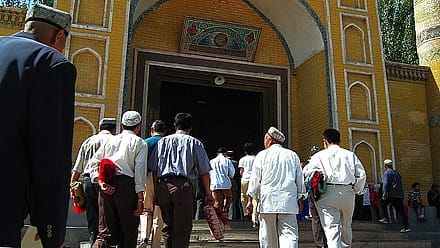“The most fundamental feature of China’s ethnic policy is equality.”
Chinese delegation, 2009 Universal Periodic Review

With a level of transparency not afforded by other jurisdictions, the high court of the Xinjiang Uyghur Autonomous Region discloses annually the number of endangering state security (ESS) trials in the region. In 2012, 314 ESS trials of first and second instance were concluded, down 24 percent year-on-year. The decline is no cause for celebration, however, since, according to Xinjiang Party Secretary Zhang Chunxian, “the struggle between splittist and anti-splittist forces in Xinjiang [is] long-term, complicated, and intense.”
Splittism and inciting splittism are ESS crimes, and information in Dui Hua’s Political Prisoner Database (PPDB) indicates that Xinjiang mostly applies them to Uyghurs—a Turkic-speaking Muslim ethnic group that accounts for 46 percent of Xinjiang’s population—who assert their cultural identity through speech, association, and assembly. (Similarly, in Tibetan regions, splittism charges appear to be disproportionately applied to Tibetans as compared with Han Chinese.) During its Universal Periodic Review in 2009, China noted that it “prohibits speeches and actions that instigate ethnic hatred and religious discrimination … a few people with the support of foreign forces try to split Tibet and Xinjiang … and the Government will not allow any attempt to split China to succeed.”
Underscoring the government’s hardline approach, Dui Hua’s analysis of official data reveals a disturbing trend: between 2008 and 2010, Xinjiang, which accounts for less than 2 percent of China’s population, accounted for 50 percent of the nation’s first-instance ESS trials. Given that splittism is the focus of stability maintenance in the region, the great majority of defendants in these trials is almost certain to be Uyghur.
First- and Second-Instance | First-Instance | |||
Year | Xinjiang | Nationwide* | Xinjiang | |
No. of Trials | No. of Trials | No. of Trials | % of National | |
2008 | 268 | 466 | 235 | 50.43 |
2009 | 437 | 698 | 378 | 54.15 |
2010 | 376 | 670 | 314 | 46.87 |
2011 | 414 | 1314‡ | 356† | 27.09 |
2012 | 314 | § | 270† | |
Source: Dui Hua, Xinjiang Courts Annual Work Report, Xinjiang Yearbook, China Law Yearbook |
Notes: * China Law Yearbook disaggregates first-instance trial data by crime category, listing eight of the 10 categories enumerated in the Criminal Law (Part 2, chapters 1‒10) along with a category referred to as “other.” Dui Hua believes that the unlisted categories of ESS and dereliction of military duty are combined under “other.” Since indictment statistics have indicated that dereliction of military duty generally accounts for less than 1 percent of indictments when placed in a separate category with only ESS, we believe that military dereliction trials account for a similarly low percentage of trials when combined with ESS and thus use “other” trials as a proxy for ESS trials. |
† Dui Hua estimate based on the assumption that 85.9 percent of combined first- and second-instance trials are trials of first instance. First-instance trials accounted for 87.7 percent of combined first- and second-instance trials in 2008, 86.5 percent in 2009, and 83.5 percent in 2010. |
‡ Given the discrepancy between this number and historical data, we do not include 2011 figures in our analysis. |
§ Data expected to be released later this year. |
Information on individual cases, however, is restricted. Of the hundreds of people tried for ESS in Xinjiang in 2012—in the ballpark of 500 to 1,300 people based on data available on the number of defendants per trial—Dui Hua has discovered public information on just two. Both are Uyghurs sentenced to more than 10 years’ imprisonment by the Kashgar Prefecture Intermediate People’s Court.
Sidik Kurban is a Muslim leader who oversaw religious homeschools throughout Xinjiang. He was convicted of inciting splittism and sentenced to 15 years’ imprisonment with 5 years’ deprivation of political rights. Abdirahman Yimerallegedly disseminated separatist ideas using removable storage devices and CD-ROM. He was sentenced to 13 years’ imprisonment with 5 years’ deprivation of political rights.
In Xinjiang, harsh sentences are routine. In 2009, the conclusion of 437 ESS trials resulted in 255 people sentenced to more than 10 years’ imprisonment, life imprisonment, or death.

Chinatourguide.com
Pointing to the US
In its most recent report on human rights in the United States, China stated that “ethnic minorities and non-Christians are also badly discriminated against in the fields like law enforcement, justice and religion, rendering the so-claimed ethnic equality and religious freedom nothing but self-glorifying forged labels.” The report specifically mentions Muslims, stating that “government anti-terrorism policies single them out for increased surveillance and monitoring.”
In China, splittism—the incitement of which can amount to little more than blog posts—is commonly lumped together with terrorism and extremism in a tripartite known as “the three evil forces.” Thus, in light of ESS data indicating that Ugyhurs, who account for less than 1 percent of the national population, likely account for around half of all ESS trials, one wonders to what extent statements about ethnic discrimination in the judicial systems of other countries serve in part to mask systemic discrimination at home.
Evidence of the treatment of Uyghurs before the law is in the hands of the Chinese government. To dispel concerns that Uyghurs face discrimination, the government should make public ESS verdicts in accordance with Article 14.1 of the International Covenant on Civil and Political Rights, and, in keeping with promises made during its 2009 UPR, do as Japan recommended and “continue its efforts to further ensure ethnic minorities the full range of human rights including cultural rights.”
An expanded version of this article including additional data is published on Reference Materials
